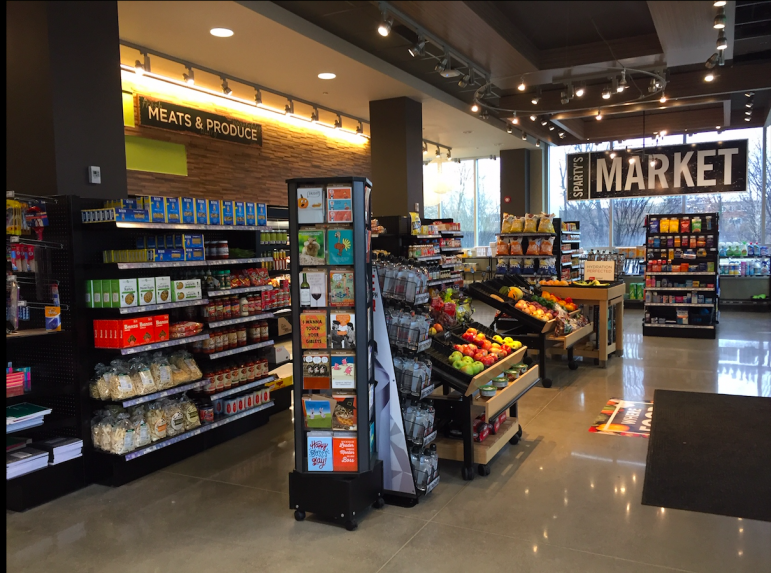Sparty’s Market is making systemic change to become more environmentally sustainable.

Ally Telfor
Sparty’s Market at 500 S. Harrison RoadSparty’s Market, an urban market-style grocery store on Michigan State University’s campus, has adopted new materials to reduce harm to the environment, such as paper-based straws, compostable plant-based straws, and cup lids that eliminate the need for straws.
Steve Krish, Sparty’s Market store manager, said, “The university is always looking to make better changes for the environment.” He the rising popularity of credits recyclable straws to social media. “You can see a lot more now out there in the world and what the concerns are.”
Krish said that in 2019, every Sparty’s location made the switch to paper straws.
“I didn’t really like them (the paper straws),” said Natalie Zielinski, an MSU student and Sparty’s Market customer. “It was hard to drink out of them after a while because they got really soft.”
Because of this issue, Krish said Sparty’s Market, a separate entity from other Sparty’s locations on campus, made the switch to plant-based straws, which are 100% compostable. He said the straw change occurred at the end of October.
“Some of those are decisions that we make on our own, per unit, and some of those are university-wide changes,” said Krish.
Also in October, he said, Sparty’s Market started giving customers the option of strawless lids. Krish said he was inspired by Starbucks’ transition away from straws because Sparty’s works so closely with the Starbucks store located next door.
Michael Everett, a faculty member in the Department of Community Sustainability at MSU, said he sees many for-profit organizations trying to make systemic change recently. He said consumers are more and more seeing value in environmentally friendly practices.
As a regular, Zielinski said she is happy with the changes. She said she lives in Wonders Hall but comes all the way to Sparty’s Market every night. She said she prefers the lids. “I think it’s good that they’re using these (lids) so that we don’t use the straws that are bad for the environment,” Zielinski said.
Everett said that the choice to eliminate straws is low-hanging fruit. “Many individuals on campus use straws from Sparty’s. So, why not try to make a behavioral change, perhaps?”
Everett said university students and faculty are willing to pay more for value-adding products. He said it makes MSU more conducive to changes like these. “If you go out of the circle/sphere of MSU you’ll see that that doesn’t exist everywhere, especially rural areas.”
Everett said the key with sustainability is a three-part model: Is it environmentally sustainable, economically sustainable, and socially sustainable? Krish said there normally comes an additional per-unit cost, normally less than a few cents. He said that this increase in price is “worth it” and will not lead to a rise in cost for the consumer.
These changes come at a time when MSU is ranked No. 19 in the nation for sustainability. The Princeton Review’s Top Green Colleges in the nation ranked 50 U.S. schools based on “a combination of school-reported data and student opinion, collected in 2018–2019 via our institutional and student surveys,” according to their website.
According to MSU Today in 2019, “college applicants and their parents are increasingly concerned about sustainability issues. Among the 11,900 teens and parents surveyed earlier this year, 64% said that having information about a college’s commitment to the environment would influence their decision to apply to or attend the school.”
Everett said MSU has a unique perspective because, “you have a unique opportunity to create behavioral change within students and, clearly, those students are the ones that are going to be the next generation of leaders in our society. So, there’s this opportunity to educate for a more sustainable environmental perspective to hopefully then send all of those students out, once they graduate, to ‘change the world.’”
Everett said there’s always room for improvement anywhere you look. He said MSU has to be willing to lay out the funds to be sustainable, which is not always easy. He said a recent example of this is MSU installing solar arrays south of campus to reduce its carbom emissions. “We see them going in, just not on every piece of land because of that,” Everett said.
Krish said it’s not just him making these changes, though he does his part through Sparty’s Market. “All of leadership is trying to make those differences for the future of the planet.”